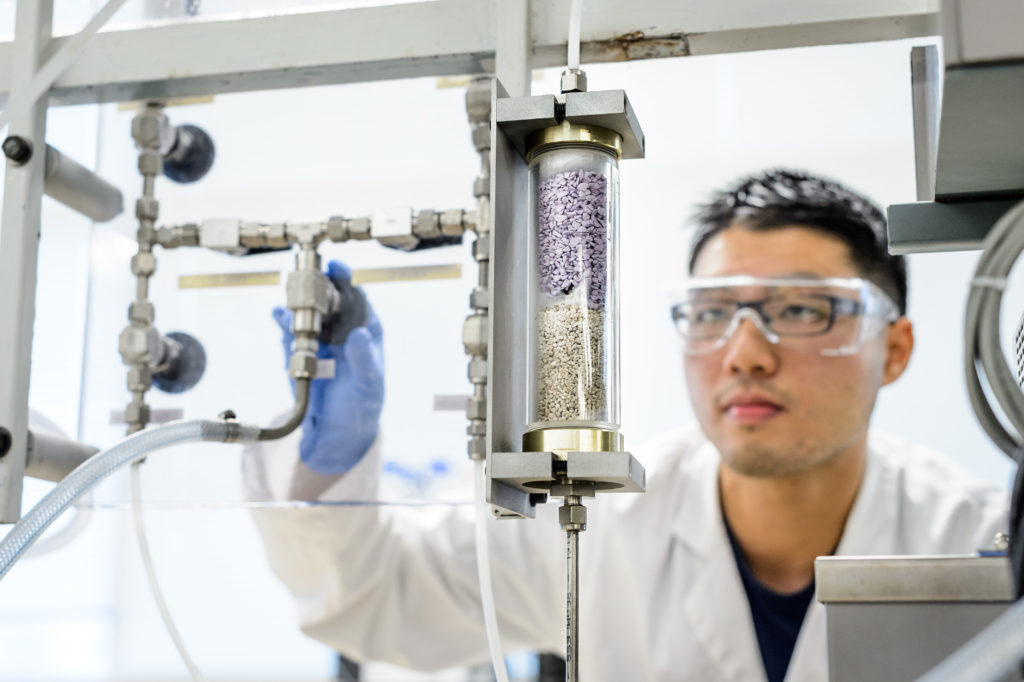
Second-year undergraduate students enrolled in UBC’s chemical engineering and chemical and biological engineering program have started their academic year under a revised curriculum, which includes four new courses aimed at introducing students to the design process, strengthening knowledge in foundational sciences and improving experiential learning in laboratories.
The changes are part of an ongoing redesign and evaluation project made possible through a special call of the Teaching and Learning Enhancement Fund (TLEF) for Undergraduate Program Evaluation and Renewal (UPER) projects at UBC Vancouver. Under the call, which was launched in 2018, departments interested in reframing the design of their undergraduate program were invited to apply for UPER funding and central resources in support of Strategy 12: Program Redesign of UBC’s strategic plan.
“It is very encouraging to see the genuine effort that is being put into improving the overall student experience,” said Thomas Oldreive, third-year undergraduate student and UPER co-op student with the Department of Chemical and Biological Engineering (CHBE). “Witnessing the work that is being done under this UPER project, I know future students will have a better understanding of the curriculum and how the information they acquire in the CHBE program will prepare them to be successful engineers.”
CHBE’s ultimate goal is to nurture not only accomplished engineers—those who will transform fields such as nanotechnology, clean energy, biotechnology and biomedical engineering for the better—but also innovative leaders and global citizens who will make an indelible impact on the world. This means providing students with more than just a prescribed set of skills and knowledge; the program also strives to foster qualities like creativity, curiosity, entrepreneurial spirit and a genuine desire to make the world a more equitable and sustainable place.
“As changes to chemical and biological engineering have been rampant, introducing new applications and interest in the recent decade, the updated curriculum is not only poised to prepare students more aptly for their careers as critical problem solvers, but also to better suit the needs of the students as active learners,” says Nabil Ali-Mohamad, CHBE Class of 2019 and former Vice-President Academic Affairs with CHBE’s Undergraduate Student Club.
Evaluating students’ achievements
So how will the revised curriculum equip students for success? According to CHBE senior instructor Dr. Louise Creagh, Director of Undergraduate Programs, a group of faculty, staff and students are working to better assess the extent to which students are achieving learning outcomes and competencies.
“The evaluation system we are creating will continually provide valuable metrics relating to student skills, attitudes and qualities, or so-called ‘graduate attributes.”
Dr. Creagh, together with instructor Dr. Jonathan Verrett, is leading CHBE to implement the curriculum updates, and to develop the new, more robust evaluation process.
“This data will allow us to confirm the benefits of curriculum changes on student outcomes, to better understand how curriculum changes impact student learning and to identify how to further enrich our programs in ways that enable our graduates to excel, for example, in emerging industries,” explains Dr. Creagh.
Data to inform the new system will come from extensive surveys and interviews involving current students, alumni, employers and faculty members, as well as retreats and feedback sessions where stakeholders are able to learn about and discuss the results.
The findings will ultimately guide the development and implementation of a revised set of graduate attribute indicators and a new program evaluation system. This project will not only bring benefits to future CHBE students, but will also impact and engage the over 420 students currently enrolled in the department’s undergraduate programs.